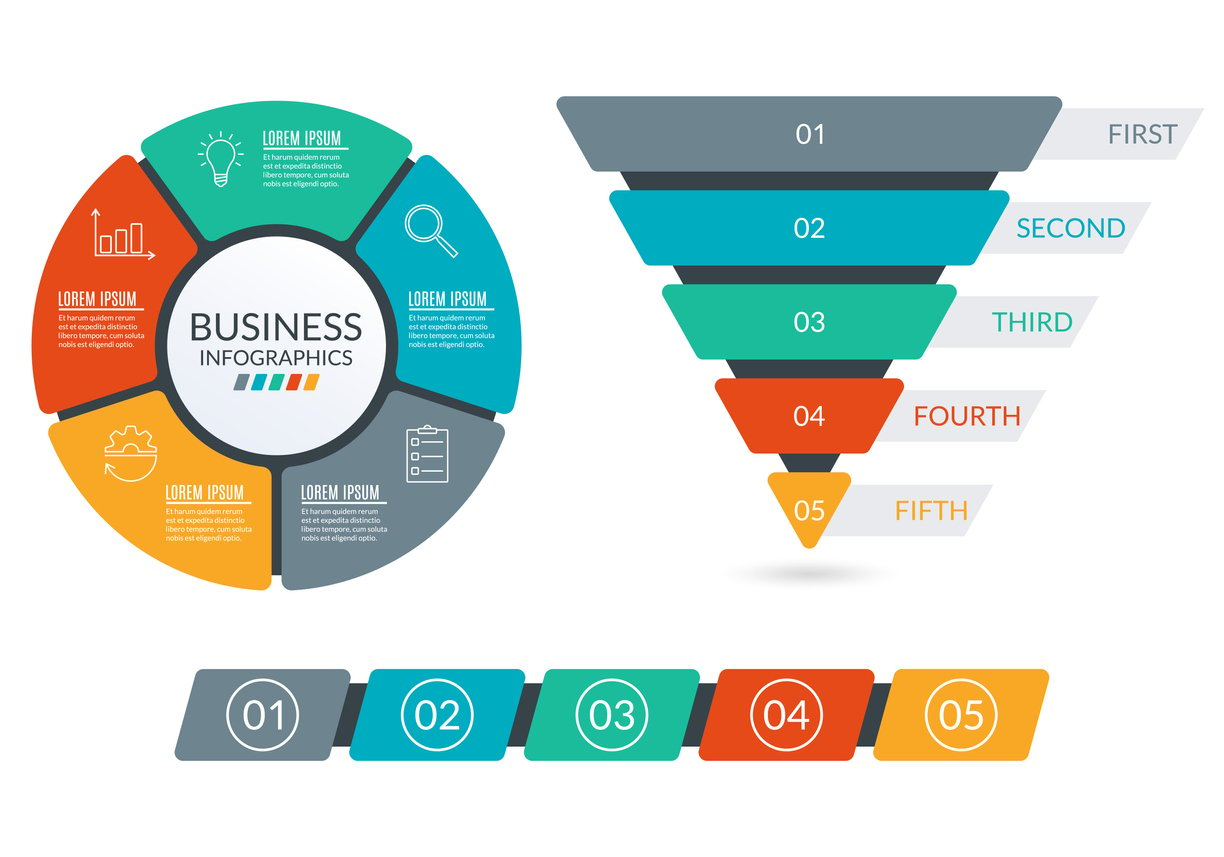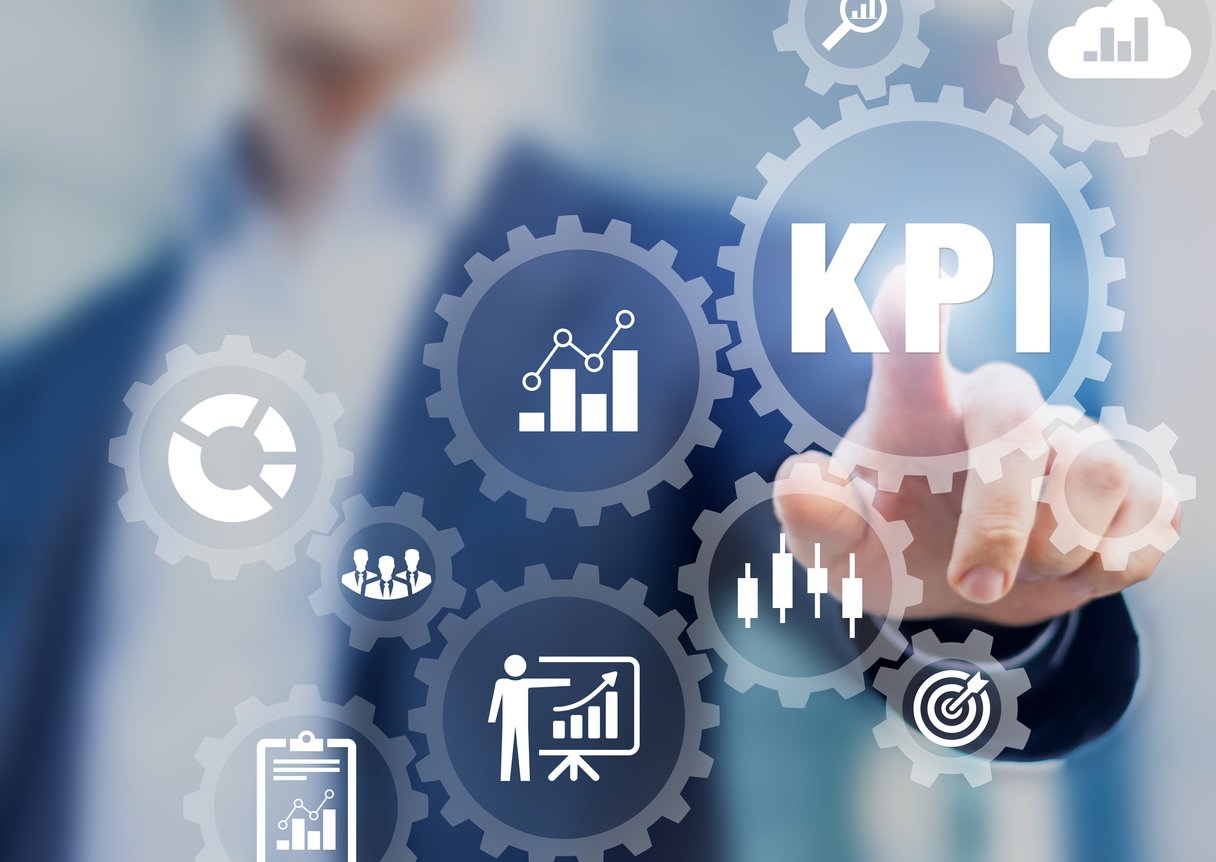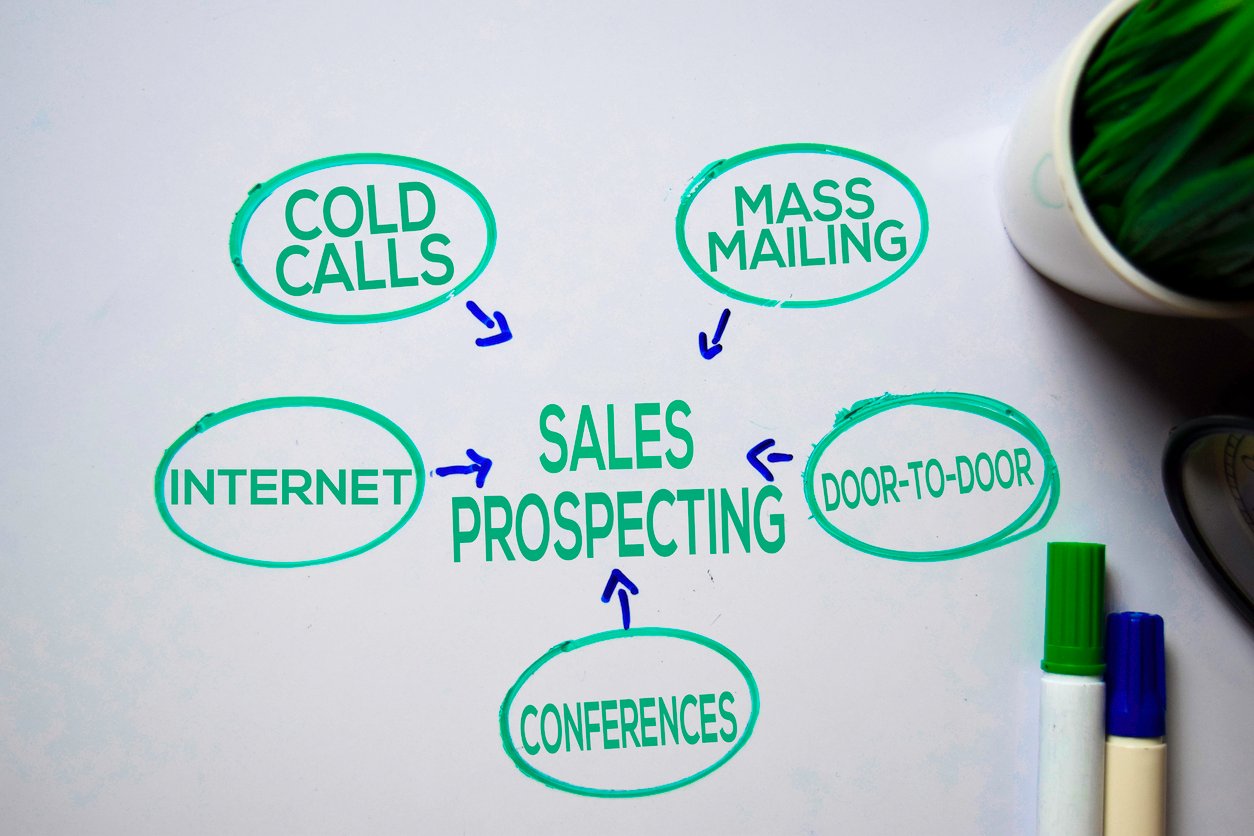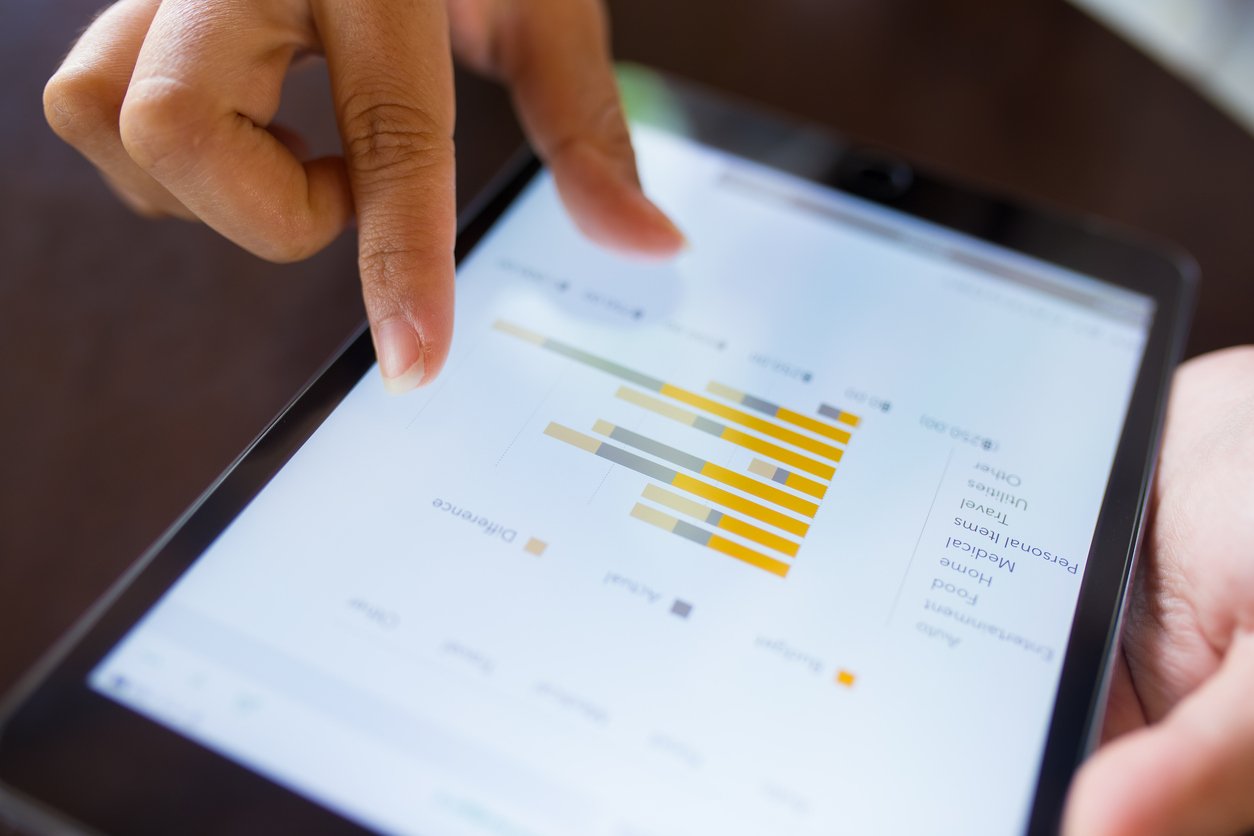
5 Ways a Predictive Dialer Can Increase Sales Efficiency
 Updated on
Updated on
By Ringy
Table of Contents
Table of Contents
You've run into a roadblock, haven't you?
Your call agents are pushing themselves to the limit, and you've hired as many of them as you can, but you still feel there is more that can be accomplished.
You're right. And predictive dialers are how you might get there.
Failing to adopt them into your sales process will mean that your call agents will get bogged down in menial tasks while your competition is charging after your prospects, looking something like this:
But not to worry. If you're looking to take the first step on the journey toward the adoption of predictive dialers, you've come to the right place.
In this article, you'll learn:
- What is a Predictive Dialer?
- How Does a Predictive Dialer Work?
- 3 Types of Predictive Dialers
- Pros and Cons of a Predictive Dialer
- Why a Progressive Dialer is Better
- 5 Ways Predictive Dialers Can Increase Sales Efficiency and Productivity
- What to Look for in a Predictive Dialer?
- Top 3 Predictive Dialer Software
What is a Predictive Dialer?
Predictive dialers have been around for some 30 years. They were first used in the banking industry. The software had a very simple objective: increasing the efficiency of call agents by taking as much manual work off their hands as it could.
A predictive dialer is a software system that selects phone numbers and dials them for a call center agent, lowering the amount of time an agent spends dialing each day and increasing the amount of time they spend on calls with customers, closing deals.
A predictive dialer uses a pacing algorithm that predicts how long it takes an agent to answer a call and modifies the dialing rate accordingly.
Call centers found that their call agents not only wasted time trying to reach numbers that were busy, disconnected, or went straight to voicemail, but that they also lost momentum in their work, lowering their effectiveness once they got onto a call as a result.
Predictive dialer spares call agents the need to deal with busy lines, disconnected calls, and other phone-related issues. The call agent's only job is to close deals and the algorithm ensures they go from one call to the next with as little delay as possible.
Predictive dialers screen out busy signals, voice mails, disconnected numbers, and so on. Once it detects an answered phone call, it immediately passes it over to a call agent.
But because phone numbers may be unavailable for one reason or another, predictive dialers also have the option of dialing a lot of phone numbers at once to raise the level of productivity.
And because a predictive dialer is an automated system, it ensures the workload distribution within a team is completely equal. Everyone gets the same amount of opportunities, and it's up to them to make the most of what they have.
How Does a Predictive Dialer Work?
A predictive dialer predicts when a call agent will next be free and dials the number on their behalf.
A predictive dialer uses a pacing algorithm that analyzes the agents' average call times. Using that, it can surmise when the agent will finish up a call and dial the next number for them. The idea is to feed the call agent a steady, unending stream of leads to work on.
This saves agents more time than one might think. It takes about 30 seconds to dial a phone number, and only one out of four calls might get answered. So technically, an agent saves two minutes every time they get on a call with a predictive dialer.
That's why predictive dialers can increase agent productivity by up to 400%.
Better yet, call agents that feel fully engaged are 15% less likely to quit.
And what's more, a predictive dialer can go a long way to helping a company execute a campaign. It makes it ridiculously easy to manage a list of contacts for an individual campaign and let the predictive dialer loose.
It'll go right down the list until it's finished.
And it'll collect data as it goes. The company using it will get insight into sales analytics and learn about the history of customer calls and the popularity of individual products. Data that can be monitored, providing the company with the insight to make necessary adjustments moving forward.
It also helps sales managers understand the effectiveness of their call agents. Because if every one of the call agents in a call center is being fed a steady diet of leads that is equal to that of every other call agent…
Well, the differences in approach and effectiveness become instantly apparent, and it becomes easy to identify the weak links and discover who needs to improve and change their approach.
3 Types of Predictive Dialers

Here are three types of predictive dialers that your company can use:
|
Types of Dialers |
Details |
|
Outbound Predictive Dialer |
|
|
Call Center Predictive Dialer |
|
|
Virtual Predictive Dialer |
|
Pros and Cons of a Predictive Dialer
Pros of a predictive dialer
A predictive dialer's pacing algorithm ensures faster response times because the dialer can assign calls intelligently to call agents. There are no pauses between calls, no time wasted on dialing or re-dialing because the number is unavailable, for one reason or another.
Predictive dialers also use databases. The goal is to provide the call agent with accurate information about the customer so the second the agent gets on the call with a prospect, they have access to all the necessary information that will help them close the deal and make a sale.
Another benefit of predictive dialers is the monitoring features they offer to companies. They make it easy for sales managers to evaluate not only employee performance but how successful certain offers and products are when it comes to customer satisfaction and conversion rates.
Based on this information, sales managers can help propose better offers that more reflect the demands of the market, as well as help, improve the performance of their call agents by offering them the help or training they need to become more effective.
Another benefit is increased employee productivity because of more time spent on calls. Agents easily make up to 300% more calls in a day. That means companies not only become more productive, but it brings a whole slate of other benefits.
For one, the need for additional agents becomes reduced and the benefits in terms of costs alone make the acquisition of a predictive dialer a sensible decision from an ROI standpoint.
Cons of a predictive dialer
Predictive dialers run on pacing algorithms, as mentioned above, but that doesn't mean they don't have their faults. They're not human, and any subpar features of the software can result in companies who don't enjoy the full range of benefits predictive dialers are purported to offer.
For one, poor answering machine detection features can waste a lot of time. Instead of moving on to the next call, a predictive dialer might mistake an answering machine for a human being on the other end of the line, interrupting the flow of work.
Another problem with predictive dialers is blank calls. Sometimes the pacing algorithm can move too fast, or there is an interruption to a call agent's usual calling pattern, meaning that they are still on the line with a potential customer while the predictive algorithm has already prepared their next call.
That can result in blank calls. The customers find themselves with no one to talk to because all the agents are busy, wasting the customer's time and the company's opportunity.
Remember, 60% of customers say they would stop doing business with a company if they receive unfriendly service.
And no one knows what the exact definition is.
Furthermore, predictive dialers with their algorithms are only truly effective for companies that have ten or more agents in a call center. If the number is lower, odds are the predictive dialer will simply move too fast, though some software do offer the option of adjusting the pacing algorithm.
And finally, predictive dialers are not as effective if an agent must absolutely know detailed information about the customer.
Low volume, high-value call centers don't benefit from predictive dialers because the objective of predictive dialers is to achieve quite the opposite. One of the reasons is that 46% of customers will jump ship if the call agent is not knowledgeable, and predictive dialers often don't give them the time to acquaint themselves with the prospect.
Why a Progressive Dialer is Better

The main difference between a progressive dialer and a predictive dialer is that predictive dialers make multiple calls at once and begin dialing before the agent is ready to take the next call because the algorithm ‘predicts' when they will be ready based on previous patterns.
With progressive dialers, however, the system only begins dialing once the agent is ready to take the next call, and only dials one number at a time.
As a consequence, progressive dialers don't make as many phone calls, but the upside of that feature is that customers never experience blank calls. The software never makes a mistake and doesn't end up with a customer on the line before the call agent is ready for the next prospect.
This is a far better option for call centers looking to improve the customer experience and customer interactions; therefore, progressive dialers are more suited to high-value customers.
If call centers find that the quality of calls takes priority over the number of calls, then progressive dialers are the choice for them.
And if a company chooses to integrate a progressive dialer with a CRM, a range of benefits become available. There are features such as local ID, to ensure the call center has a familiar number, no matter which country they are calling, and Cloud VOIP Softphone allows them to call directly from the CRM platform.
Not to mention that companies get to track and record communications, ensuring they can monitor the effectiveness of their call agents as well as helping ensure they never dial the same number twice.
5 Ways Predictive Dialers Can Increase Sales Efficiency and Productivity
If you're still interested in predictive dialers, then we might as well tell you a thing or two about how they might help increase the efficiency and productivity of your call center.
Here are our favorites:
1. Stronger lead management
Predictive dialers that can be integrated with a CRM can qualify leads ensuring that at any given moment, a call agent is talking to the prospect that is most likely to become a customer.
Another benefit offered by CRM integration is that all call activity can be captured by the CRM database providing crucial KPIs that further help drive sales and improve marketing.
2. Greater agent productivity
As mentioned above, predictive dialers have a great impact on agent productivity. By allowing agents to focus exclusively on phone calls instead of dialing, call agents no longer waste so much time.
Predictive dialers filter out unresponsive phone numbers, meaning call agents move from one phone call to the next with no delay.
3. Increased sales
With increased productivity, increased sales are the logical consequence.
If call agent productivity goes up by 200-300%, odds are that sales will go up by that same percentage. Right?
But it gets even better. Predictive dialers not only allow call agents to make more calls. By integrating them with a customer relationship management system, call agents gain access to information that provides them with the tools they need to be more effective salespeople.
So sales end up getting an even bigger boost.
4. Reduced contact center costs
If your predictive dialer increases the productivity of your call agents by 300%, then that means the number of agents who can do the same amount of work can be 3x smaller. Or, at least, you don't need to hire new call agents to increase the call center's workload.
That means the costs of running a call center take a dramatic dive. You need less time and money to hire new call agents and train them, which is why the cost-effectiveness of predictive dialers should be measured in how much they save a company in expenses.
Furthermore, integrating predictive dialers with customer relationship management systems means companies get to avoid the costs that come with expensive telecom hardware.
5. Allows sales managers to track agent performance
Any software that offers sales managers insight into the performance of their call agents is a good idea.
It helps put an end to the mystery of why some call agents might perform better than others and presents the answer in the form of cold, hard data.
So instead of firing a call agent that seems hopeless and wasting resources on finding and training a new one, sales managers get to learn exactly what kind of additional training call agents need to improve their conversion rates and rise to the required level.
What to Look for in a Predictive Dialer
1. Cost
The price of predictive dialers can vary. The most important difference is whether a company chooses a hosted predictive dialer or an on-site predictive dialer.
On-site predictive dialers can cost anywhere from $3,000 to $200,000 whereas hosted predictive dialers can cost from $25 dollars per agent per month to $500 per agent per month.
The price is largely dependent on the features offered by the software providers, which is why companies need to take ROI into account before making decisions.
2. Easy CRM integration
By enabling a predictive dialer to integrate seamlessly with a CRM, call agents gain access to important benefits.
If all the customer information is stored on a CRM platform, then integrating the predictive dialer with the platform means that agents get all the customer information they need as they get on the call with a potential customer.
Call agents gain access to customer profiles, records of previous interactions, and so on. Every piece of information is useful, especially with predictive dialers, which do not give call agents the time to familiarize themselves with individual customers before getting on the phone with them.
3. Answering machine detection
This one is all about agent productivity. If a predictive dialer can determine the difference between an answering machine and a real person, it means it does not transfer phone calls to agents that end up wasting their time.
Instead, the predictive dialer leaves a pre-recorded message on the answering machine and moves on to the next call.
4. Pacing algorithm customization
As mentioned earlier, if a predictive dialer does not offer companies the opportunity to customize the pacing algorithm of the software, it means the predictive dialer cannot be adjusted to the specific needs of a company.
Perhaps the basic settings of the pacing algorithm best answer the needs of a call center with 30 agents. But what does that mean for call centers with 40 agents or call centers with 20 agents?
It is absolutely necessary that any predictive dialer you choose offers the option of customization when it comes to its pacing algorithm, allowing the predictive dialer to adjust to the needs of the company.
Top 3 Predictive Dialer Software
1. Nice CXOne
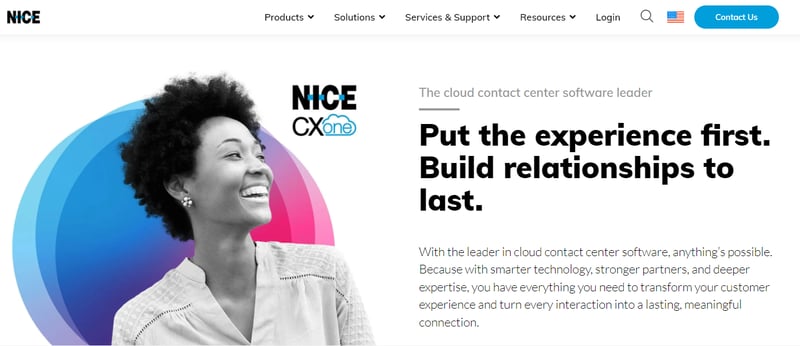
Nice CXOne is a cloud-based call center predictive dialer that combines omnichannel routing, analytics, and workforce optimization. The company's goal is to provide organizations with the opportunity to provide great customer service by enabling them to respond quickly to customer expectations.
The software offers customers:
- Reporting and dashboards
- Speech analytics
- Voice and webchat
- Auto dialer
The company offers three pricing packages, though the cost of each package is not disclosed.
When it comes to user experience, many praise the performance of the software though there are those who claim it to be full of bugs. You can read more reviews here.
2. JustCall
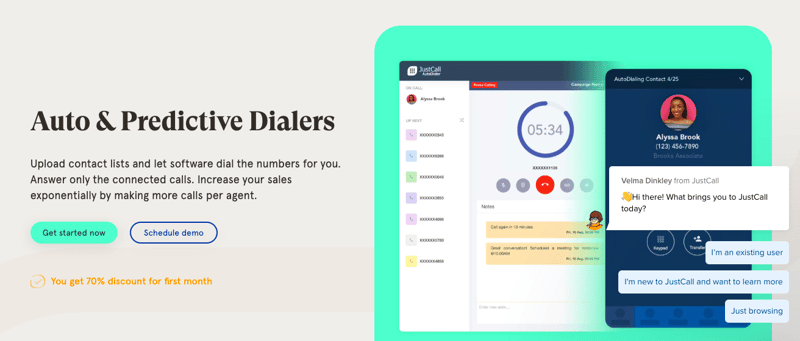
JustCall is a cloud-based phone system designed to enable its customers to make, receive, and monitor phone calls. They offer businesses the chance to get phone numbers in 58 countries. The system is most often used by mid-sized companies.
The system offers its customers:
- Automatic call logging
- Native CRM integrations
- Virtual call center
- Sales dialers
The company offers potential customers three pricing plans.
|
Plan Type |
Pricing |
|
Standard |
$25/month per user |
|
Premium |
$50/month per user |
|
Enterprise |
Potential customers must request a quote, a minimum of 100 users |
You can check out their pricing plan in more detail here.
3. Connex One
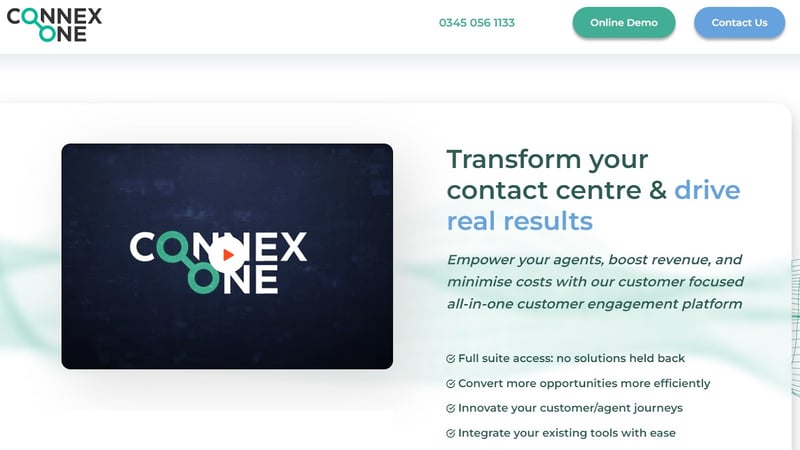
Connex One is a customer engagement platform that helps companies engage with their customers through a cloud-based omnichannel engine. They aim to provide companies with the tools needed to consolidate the customer journey on a single platform.
These features include:
- AI automation
- Enhanced data insights
- Next-generation dialler
- Workflow optimization
In an attempt to offer full transparency, Connext One does not offer pricing plans but tailors the cost of their platform to each customer to ensure a great level of flexibility and customization.
Conclusion
There is no denying the role predictive dialers can play in the increase in agent productivity at call centers.
There is also no denying the other benefits:
- Increase sales
- Lower call center costs
- Better oversight
- Stronger lead management
But you cannot ignore the risks of customers receiving blank calls, or the fact that predictive dialers work best for call centers with at least eight agents who are more interested in the number of calls than they are in offering each prospect the best possible customer experience.
So, depending on your company's specific needs, you will have to decide which downsides you can live with and which ones are unacceptable. And if you wish to make an even more informed decision, we invite you to educate yourself further about the differences between various types of dialing software by visiting our call center solutions page, and booking a demo today!

Skyrocket your sales with the CRM that does it all.
Calling? Check. SMS? Check. Automation and AI? Check. Effortlessly keep in touch with your customers and boost your revenue without limits.

Take your sales to new heights with Ringy.
Sales in a slump? Ringy gives you the tools and flexibility you need to capture leads, engage with them, and turn them into customers.
Subscribe to Our Blog
Enter your email to get the latest updates sent straight to your inbox!
Categories
Related Articles







































